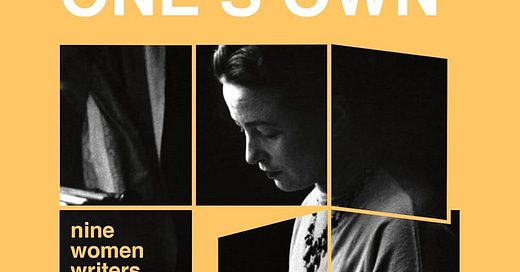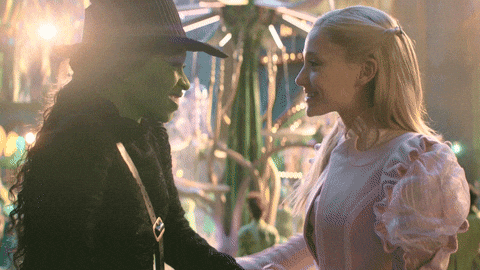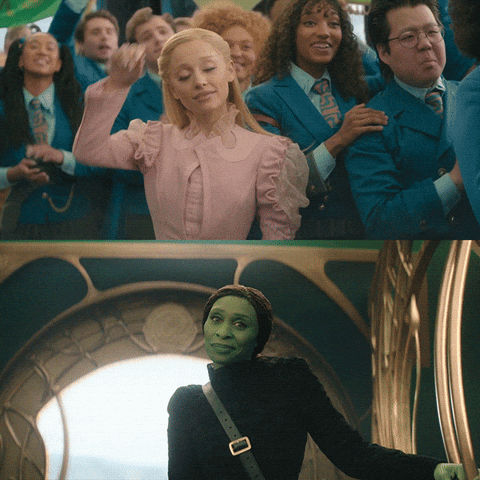This One Is For My Girlies
Life does not offer a gentle shelter to women who are not part of the orthodoxy.
“The fact that something ended doesn’t make it a failure— a lesson, it seems, I must learn over and over again.” — Joanna Biggs.
This piece is dedicated to those, like me, who experience a restless yearning within the constraints of societal expectations and find solace in the company of their female friends. Enter A Life of One’s Own: Nine Women Writers Begin Again by Joanna Biggs, a book that delves into the lives and works of Mary Wollstonecraft, George Eliot (the pen name of Mary Ann Evans), Zora Neale Hurston, Virginia Woolf, Simone de Beauvoir, Sylvia Plath, Toni Morrison, Elena Ferrante, and Joanna Biggs herself.
Learning from the Lives of Women Writers
What I didn’t realize before—but what reading these women’s lives and works has shown me—is that there are countless ways to do meaningful work and live a fulfilling life, and that achieving this within conventional structures is rarer than one might think. The examples these women offer sometimes fill me with despair, yet more often, they inspire me to think: if she could do it, then perhaps I can try. I never imagined I could be Simone de Beauvoir, but I have always known she existed. In moments when I’ve felt utterly lost, clinging desperately to the crumbling fragments of my life, that knowledge alone has been enough to sustain me.
The most important lesson these writers—my mentors and companions—offer isn’t that I should replicate their lives, but rather that I shouldn’t. Their stories exist not as blueprints but as invitations to trust myself enough to chart my own path. I know the decisions I make may have unintended consequences, but I promise myself this: I will face those consequences when they come. Perhaps the ultimate freedom lies in taking the wreckage of your life and writing your own story with it. That’s what Mary, George, Zora, Virginia, Simone, Sylvia, Toni, and Elena did for themselves.
It’s what I can do for myself—and what you can do, too.
Reading as Transformation
I don’t read to admire writing solely for its sophistication—I read to be transformed by it. I seek to step into another’s life, to experience that electric moment of recognition when words articulate something I’ve felt but never expressed. Like Biggs, I read not to accumulate knowledge but to be reshaped by it. Reading has the power to change one’s mind, but its impact often runs deeper: it redefines how we live, expands the boundaries of what we know, and opens the door to entirely new ways of being.
Biggs captures this beautifully:
“You might speak up at the dinner table like Mary Wollstonecraft, or take up drinking wine and crying like Simone de Beauvoir, or get up early to write like Lenù in Elena Ferrante’s Neapolitan novels. You might try an open marriage or decide to have a child with a lover or determine to lie to get ahead. It is not about self-improvement but about freedom. And one of the ways you put on your freedom is by changing—becoming less of a feminist or more of one, writing more or something different or giving up altogether, gaining the courage to act according to your beliefs or condemning society from seclusion.”
Reading these women’s lives doesn’t prescribe a specific path; it illuminates the freedom to change, to create, and to live boldly. And in doing so, it reminds me—and perhaps you—that we, too, are the authors of our own lives.
Teachings from Ancestors
When Biggs was losing her mother—slowly and then definitively—she also lost the sense that she could cope with more: being a daughter, a mother, an editor, and a writer all at once. Her mother had been living proof that women endure, yet in grief, that evidence faded. Toni Morrison offers solace in such moments: turn your parents and grandparents into ancestors—figures you carry with you, offering constant encouragement. Morrison herself felt “endowed” by the “tenacity” of her female ancestors.
Biggs shows us that grief evolves—it shifts, recedes, and even inspires. Her mother became an ancestor, much like Morrison became one for Biggs. This lineage of encouragement spans generations: Wollstonecraft inspired Eliot, Eliot influenced Woolf, and Woolf became a touchstone for Plath. These women, in turn, become guiding lights for one another and for us, offering strength and resilience when our lives diverge from conventional paths.
From Eliot, Biggs learned not to let perfection become the enemy of the good—a lesson I resonate with deeply. I’ve struggled with this myself: hesitating to speak unless I’ve planned the perfect words, postponing dating until I lose weight, or revising my writing endlessly before sharing it. Biggs also gleaned from Eliot that ambition is vital, but it must not imprison you if your goals no longer bring happiness.
Zora Neale Hurston taught Biggs—and me—to distinguish between growing up and growing into oneself. Hurston reminds us that endings, even painful ones, carry the energy of beginnings. Falling in love, despite its risks, holds the power to reorder a life. And, crucially, the struggles of living are unending—neither marriage nor singledom offers a permanent solution.
Hanging Out with Virginia
Channeling Virginia Woolf, Biggs moved to New York at 39. Her divorce, her mother’s illness, and the experience of watching her mother fade away left her craving what she called “American openness.” This move wasn’t about conventional ambition; it wasn’t about climbing upward but expanding outward, seeking a broader and more meaningful life. As she puts it, “I was embarrassing the English with my need to earnestly remake my life, but Americans understood wanting a life of one's own.” 👌🏾
Additionally, reading Woolf highlights the significance of book clubs—not just for women, but for anyone seeking deeper engagement with ideas. It’s not about some mythical sisterhood but about the power of accumulated voices, creating space for an individual voice to emerge. Solidarity may not directly lead to change, but there is undeniable safety and strength in numbers. Rather than reading solely to absorb history, science, or cultural trends, women benefit from viewing themselves as part of an ongoing conversation—listening, speaking, and gradually, over time, establishing a shared tradition.
Woolf’s essays convey a sense that literary criticism, at its best, should resemble an ongoing conversation—one that evolves over time between like-minded and opposing perspectives. This gradual, almost evolutionary process refines our understanding of what books are truly for. Like Simone de Beauvoir, Mary Wollstonecraft, Zora Neale Hurston, and Sylvia Plath, Woolf worked across genres, defying the arbitrary boundaries imposed by some long-forgotten figure (undoubtedly a man, of course). Yet Woolf also shared profound insights into what books meant to her and what they could mean to others—insights that, for me, hold far more relevance now than the rigid academic frameworks I encountered at the universities I attended.
Plath Meets Keegan
Sylvia Plath captures the relentless, all-encompassing desire to have it all—an aspiration society has long reserved for men. In her journal, she writes:
“Being born a woman is my awful tragedy. My consuming desire to mingle with road crews, sailors and soldiers, bar room regulars is spoiled by the fact that I am a girl, a female always in danger of assault and battery. My consuming interest in men and their lives is often misconstrued as a desire to seduce them, or as an invitation to intimacy. Yet, God, I want to talk to everybody I can as deeply as I can. I want to be able to sleep in an open field, to travel west, to walk freely at night.”
Yet, she can’t—she couldn’t. And we still can’t.
Claire Keegan’s Antarctica reveals how little has changed. Women remain tethered by the ever-present threat of violence. Only men can live blissfully carefree.
Plath’s ambition legitimized my own desires. Like Biggs, I found the Plath in me, realizing that waiting for permission—a permission that would never come—was futile.
*
"Out of the ash
I rise with my red hair
And I eat men like air."
Just some classic Sylvia, steeling herself to confront her rival, her ex, and the inevitable swarm of gossipers—her usual fuck-you mantra thrumming in her head, straight from Lady Lazarus.
Hanging out with Toni
As Biggs reminds us, Toni Morrison famously said, “Do both: dance and cook. If we can’t, it can’t be done!” Reading Morrison made Biggs reflect on how conventional womanhood is often framed as incompatible choices. This became especially acute when she considered staying in a traditional marriage or taking a leap into the unknown. Her inner response was resolute: “Hell yes!”
One of the challenges Biggs grappled with was the seeming impossibility of having children and writing. She feared she wouldn’t be able to cope. Morrison doesn’t deny that writing, editing, and parenting are sometimes in conflict. Instead, she encourages women to embrace those tensions and begin neutralizing them by “bringing them together.” Morrison pushes us to ask: must the elements of a full life always be in conflict? If we must do these things anyway, why not reframe them as complementary—or even compatible—and embrace them as part of a rich, multifaceted adult life?
Of course, it’s not lost on me that only women are often left to think, worry, and strategize about how to make this balance work. True progress demands that men join us in the effort to “bring it all together.”
Thanks to Toni, and much like Biggs, I now feel more confident that it is possible to do more than one thing. I’ve also come to recognize my own capacity to care for both myself and others, as I’ve done for my father, mother, and family during difficult times. Morrison’s wisdom affirms that this multiplicity is not only achievable but also deeply meaningful.
Hit Play On Mina’s “Un anno d’amore”
Sessioni di urla con Elena Ferrante
Like Beauvoir, we seek freedom but we fear solitude. And so, we read Elena.
Ferrante’s women draw us in—they fight, they endure, and they cope. As Biggs aptly noted, Ferrante’s characters “don’t submit.” In a 2006 interview, Ferrante described her women as fighters who, despite not winning, find ways to reconcile with their expectations and forge new equilibriums.
This search for balance is central to The Days of Abandonment. In one striking scene, Olga, the protagonist, is stuck at home with her two small children. One of them is ill, and the other has assumed the role of caretaker:
The child had on his forehead three coins and in fact he was sleeping, breathing heavily. “The coins are cool," Ilaria (Olga’s daughter) explained. “They make the headache and fever go away.” Every so often she removed one and put it in a glass of water, then dried it and placed it again on her brother's forehead.
“When he wakes up he has to take an aspirin,” I said.
Ferrante’s work offers new ways to imagine life and find solutions. Things fall apart, but readers never lose hope. These strange, experimental interludes lead inevitably to renewal.
One of the problems of writing as a woman, as Ferrante sees it, is having to repurpose traditions that have been invented by men.
One of the challenges Ferrante often explores is the act of writing as a woman—an endeavor shaped by traditions invented by men. She insists that some boundaries must dissolve, for the world as it exists is not designed for women. Defiance, then, becomes essential. The obedient, tidy lives women are often conditioned to pursue will not give rise to brilliance, to voices like Gertrude Stein’s or Lila Cerullo’s.
Simone de Beauvoir, in The Second Sex, makes a similar argument:
“Don’t do your prescribed reading, women; read something that attracts you instead. Go for a walk toward the ocean you’ve never seen, rather than laps around the park. You don’t have to stay married to anyone you don’t want to stay married to—shape your life into something that makes sense to you, first and foremost.”
Ferrante’s Neapolitan Quartet reminds us that change is the only constant—and it is not always for the better. “Sit still and the boundaries will dissolve; run toward change and the boundaries will also dissolve,” she writes. Through this, Ferrante reveals how the rigid shapes imposed by patriarchy, capitalism, and tradition are too often accepted without question. When we look clearly, we realize they are intolerable. Across her work, including The Days of Abandonment, Ferrante’s women and men alike grapple with these outdated forms, struggling to break free and find new ways of being.
Female Friendships, a.k.a. Girlies, Should Be the Pillar of Women’s Lives
I’ve often struggled to articulate how much my female friendships mean to me—how my “girlies” complete me, how much I resent the constraints of commitments and societal expectations that keep us apart, and how electric it feels when we reunite. Then I found the words in Ferrante’s work:
In My Brilliant Friend, Lenù writes of Lila:
“I sometimes imagined what my life and Lila's would have been if we had both taken the test for admission to middle school and then high school, if together we had studied to get our degree, elbow to elbow, allied, a perfect couple, the sum of intellectual energies, of the pleasures of understanding and the imagination. We would have written together, we would have been authors together, we would have drawn power from each other, we would have fought shoulder to shoulder because what was ours was inimitably ours. The solitude of women's minds is regrettable, I said to myself, it’s a waste to be separated from each other, without procedures, without tradition.”
This perfectly encapsulates how I feel about my girlies (you know who you are).
And then there’s Biggs. Biggs’ greatest gift to us is not only her love for Ferrante’s work but her response to it. By taking Ferrante’s lament about the separation of women’s minds and turning it into action, she has created this small press—a space where women’s voices converge and thrive. Reflecting on her own choices, Biggs writes, “If marriage couldn’t hold me, what about other structures?”
It’s a beautiful question, and the press she has built is a beautiful answer. We are grateful.
I often think about the choices Ferrante made in her work to show us the myriad possible shapes a woman’s life can take. Those of us trying to craft new lives in the 21st century have so much to learn from her—and we are so prone to forgetting. Thankfully, Biggs is here to remind us. And for that, we are grateful.
✨
“Books are a great way to hang with people you can’t be with: I don’t feel as much when I go to Beauvoir’s grave in Montparnasse as I do when I read The Second Sex.” — Joanna Biggs.






